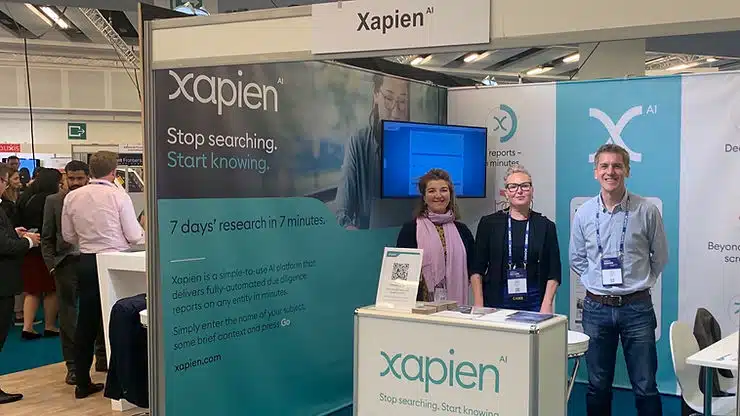ACAMS 2022: A disrupted world – sanctions and supply chains

The conversation on ESG and supply chain risks continued on Day 2 of ACAMS Europe 2022 with A disrupted world – sanctions and supply chains led by Dr Justine Walker and featuring Arjun Ahluwalia, Alexandra Belmonte and Allan Jørgenson.
The key themes were:
- The impact of Covid, sanctions, and climate adaption on international trade, supply chains and finance.
- The latest developments in industrial human rights and corruption sanctions, and their consequent impact on supply chains
- How to develop effective supply chain risk assessments to identify risk exposure through data analytics and holistic KYC & CDD
“We need to think about resilience in a different way” – Allan Jørgensen
Whilst the panel acknowledged that Covid and the sanctions against Russia had led to massive disruption on supply chains, they were keen to look to the future where the focus was on climate adaption. This means diversity and redundancy in supply, which means sourcing from difficult areas that you might not understand. Having robust systems that enabled businesses to understand their supply chains was essential.
This means better, longer term preparation.
A changing regulatory environment
For Allan Jørgenson, the regulators need to have consistency across what ‘responsible business conduct’ – ethics, integrity etc – really means. The UN’s soft law policies on such issues were increasingly becoming regulated. For example, the EU is bringing in mandatory due diligence for responsible business conduct.
“There is a lot more adherence to the spirit of the law and not just the letter.”
As Arjun Ahluwalia pointed out – beyond the regulator – society, employees, investors, and customers are now all stakeholders and will hold companies to account for climate and ESG measures. Pressure is coming from all levels of the business. Businesses therefore need to think about how to manage these pressure in a manageable, sustainable way. In a way that they can justify not just to their investors, and customers, but their employees and the wider public. Employees no longer just need a purpose to get them up in the morning, but this purpose has to be backed up by values that they can commit to and believe in.
Set against this background, Alexandra Belmonte made the distinction between the ethical dilemma; ‘doing the right thing’, and legal dilemma; setting the minimum standards. Every company now faces a choice between these two.
At Xapien we often talk of the “can we” vs “should we” distinction. Whereas companies used to ask “can we do business with someone”, a purely compliance question, they increasingly ask “should we”, a values-led question.
As Dr Justine Walker puts it, “the ethical risk framework is now sitting with everyone”. Sanctions, anti-bribery and corruption and ESG risks were now all rolled in together under this banner of ethical risk.
KYC data: rubbish in, rubbish out
Allan Jørgenson set out one of the challenges in managing ESG risks: investors and funds relying on backward looking data. Many companies which are now being sanctioned were listed in various ESG indices as sustainable. With more nuanced, contextualised data and a better understanding of their counterpart, companies would have been able to make stronger predictions and manage these risks better.
At Xapien we weren’t really surprised by any of the individuals and entities who were sanctioned. The depth and context that our reports provided on the individuals revealed their proximity to the Kremlin. Our clients were able to see early on that this would make them more likely to have sanctions put against them.
When it comes to KYC, Alexandra Belmonte leant in to this problem. Given that there is no clear KYC requirement as yet on companies when it comes to their supply chain risks, data collection can be extremely patchy. It was essential for companies to collect reliable, broad and contextual data about their counterparts. This includes the individuals who are behind the companies – the directors and shareholders. If the data is rubbish, the result will be rubbish.
This can be challenging work for companies, which is where we at Xapien want to help.
Xapien is a simple-to-use AI platform that delivers fully-automated background reports on any individual or organisation in minutes. Harnessing carefully trained AI models and powerful Natural Language Processing, Xapien looks deep into the vast quantities of online data to detect patterns and connections which reveal ESG risks. Simply enter the name of your subject and press Go. In a few minutes, Xapien will deliver a fully- referenced, shareable report.
Book a demo with one of our team now to find out more.
AI insights, straight to your inbox
Stop searching.
Start knowing.
Search engines are great but they are only the starting point. Finding, reading and condensing the full picture is slow, hard, and painstaking work. Xapien can help.